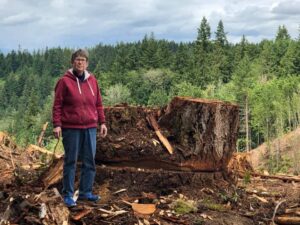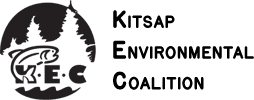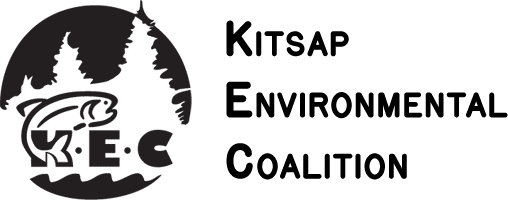
Sawdust Hill Road clear-cut June 2019 – Poulsbo, WA (photo courtesy of Pam Keeley)
FORESTS IN CRISIS
The Earth’s forests—magnificent, ancient oxygen factories and homes to wildlife—are being destroyed at alarming rates. We know the arguments to cut trees: forests will grow back; we need wood; we need more farmland; indigenous wildlife matters less than human habitation. Such reasoning is dangerously shortsighted. Until the 20th century, mankind considered nature an inexhaustible resource, and so mined the world for its riches (just as men enslaved millions for “free” labor). The cornucopia is emptying out now. We’re well on the road to starving ourselves of oxygen, killing the soil, and ridding the world of creatures.[1]
Previous issues of Now Hear This have reported on the fight to ban toxic herbicides used in weed management and GMO tree cultivation. But a much larger issue looms, and Kitsap plays a part in it: deforestation. Timber companies such as Pope Resources, Rayonier, and Green Diamond—and, crucially, the state’s own Department of Natural Resources—are mowing down Washington’s forests at warp speed. The motive for both industry and state government is money, and it appears impossible to wean these actors from their suicidal practices.
The Amazon is often referred to as Earth’s lungs. The present burning of millions of acres of Amazon forest is poised to asphyxiate humanity. Even larger fires, which the media are under-reporting, rage in central Africa and in Indonesia, and vast peat fires in the north (millions more acres in Alaska, Siberia, and Greenland) spread smoke haze across the planet. The New York Times says this “world of fire” is fast creating a feedback loop hastening climate change.
What is our “green” state doing in the face of the ongoing catastrophe? Nothing. Timber companies continue to cut trees down, as does state government.
Dismayed citizens post well-meaning messages on social media and send checks to groups or political candidates in the fight. We’ve all been there: we decide to leave it to someone else while we lead our very important lives. But such business-as-usual doesn’t suffice. Government, when it moves at all, moves more slowly than a snail in your garden. Jay Inslee’s ambitiously detailed climate-justice plan (which apparently didn’t get traction with most voters) called for cutting pollution in the US to near zero by 2045. 2045? What remains then, given that global warming now increases at a speed science couldn’t have predicted even ten years ago? Individuals—you, dear reader—need to get engaged: write letters to elected officials, talk to neighbors, and attend city council meetings. Change doesn’t happen when those in charge think everyone is OK with the status quo. Make noise. Bang pots and pans. Vote for people who will listen and do something. Boycott polluters. Wave signs.
Washington State’s environmental policy has remained sleepily inadequate to the present crisis. But now the Washington Environmental Council (WEC), an influential group of attorneys, academics, philanthropists, corporate officeholders, and conservationists, has sounded the alarm on the state’s forest policy and practices. Earlier this summer the WEC sent a 26-page letter to Hilary Franz (WA Commissioner of Public Lands, and head of the Board of Natural Resources), strongly urging the state to adopt a carbon policy to guide how the Department of Natural Resources (DNR) manages forests in the face of climate change. Some excerpts:
“Climate change poses a severe threat to the well-being and livelihoods of all Washington’s residents, and also to the health and productivity of the forests that BNR manages for today and tomorrow’s beneficiaries. Every aspect of forest management affects and is affected by climate change. The impacts are occurring today and are rapidly getting more severe. It is no longer tenable to manage the state’s valuable forests without an express, stand-alone policy addressing the exigent crisis of climate change…
Without a formal climate or carbon policy, the BNR fails to recognize the value of the sequestration potential of state trust lands and has not adequately guarded these lands against the harmful effects of climate change.[2] Its inaction has therefore endangered the welfare of Washington’s lands and residents…
The aims of a BNR climate change policy should be twofold: (a) to protect resources held in trust against the impacts of climate change, and (b) to harness the power of Washington’s state forests to mitigate climate change by sequestering carbon and to gain value from providing such benefits.”
Great, but it turns out that commissioner Franz never even showed the WEC’s letter to her Board of Natural Resources. KEC members who trekked to the 9/3 BNR meeting in Olympia were flabbergasted by this omission, and made sure to quote liberally from the letter during public comments at the meeting. Pam Keeley has now sent the full text to the Board’s members. But government bureaucracy works in mysterious (and decidedly undemocratic) ways.
In addition to the State’s own trust lands, the DNR must also regulate and stop the private timber companies’ rapid-fire clear-cutting. They MUST come to terms with our new reality before it’s too late.
In other countries and municipalities, the snail is starting to budge (or at least thinking about starting to budge). The DNR can no longer use forests as ATMs to pay bills. Is it too late to save the Earth’s lungs? We fervently hope not. Through individual and group action let us ensure air for future generations to breathe.
TOXIC HERBICIDE SPRAYING IN JEFFERSON COUNTY
The August 2019 NHT newsletter was guardedly pleased to announce that Pope Resources promised not to spray glyphosate from helicopters on its clear cuts in Kitsap County for the rest of this year. Their statement prompted the seemingly paranoid question: where will they spray, then? Paranoia justified. Pope announced its intent not only to spray Kitsap parcels from backpacks, but, more egregiously, to aerially spray thousands of acres in Jefferson County, including right near the lake that provides Port Townsend’s drinking water. A hundred people protested at the county commissioners meeting on August 19, while a contingent of protesters stood vigil just outside Pope land off Highway 20 near City Lake. The Port Townsend Leader reported on Jefferson residents’ outrage and lawful protests.
But Pope will be Pope. In what protesters perceived as clearly intentional, after spraying the City Lake clear-cut the helicopter directly sprayed them, as well as a number of cars passing by on the road, with toxic herbicide. Citizens have documented the sprayer’s flagrant violations of regulations (acceptable hours and boundaries for spraying, weather conditions, drift, etc) with time-stamped photos and video. The 3rd man in charge of DNR was on site, joking with a Pope forester during the application. It is the job of county and state government to protect citizens and enforce regulations on the timber companies. It would behoove the DNR to show it cares about its mandate, but the victims of the assault are not holding their breath.

